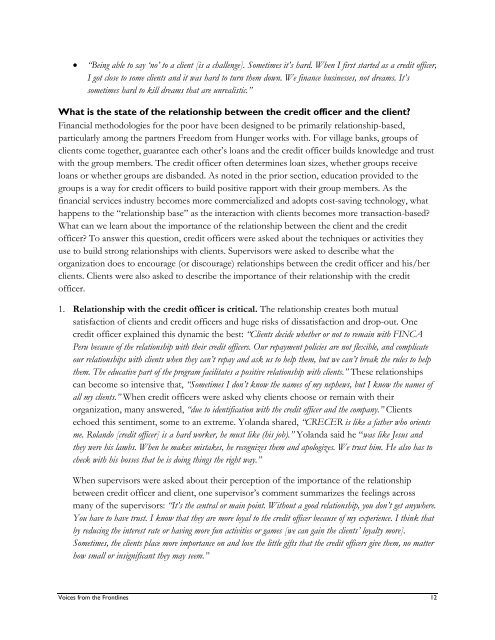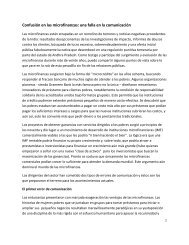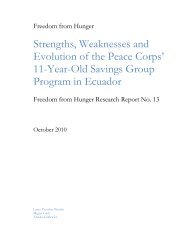Voices from the Frontlines: - Freedom from Hunger
Voices from the Frontlines: - Freedom from Hunger
Voices from the Frontlines: - Freedom from Hunger
Create successful ePaper yourself
Turn your PDF publications into a flip-book with our unique Google optimized e-Paper software.
“Being able to say ‘no’ to a client [is a challenge]. Sometimes it’s hard. When I first started as a credit officer,<br />
I got close to some clients and it was hard to turn <strong>the</strong>m down. We finance businesses, not dreams. It’s<br />
sometimes hard to kill dreams that are unrealistic.”<br />
What is <strong>the</strong> state of <strong>the</strong> relationship between <strong>the</strong> credit officer and <strong>the</strong> client?<br />
Financial methodologies for <strong>the</strong> poor have been designed to be primarily relationship-based,<br />
particularly among <strong>the</strong> partners <strong>Freedom</strong> <strong>from</strong> <strong>Hunger</strong> works with. For village banks, groups of<br />
clients come toge<strong>the</strong>r, guarantee each o<strong>the</strong>r’s loans and <strong>the</strong> credit officer builds knowledge and trust<br />
with <strong>the</strong> group members. The credit officer often determines loan sizes, whe<strong>the</strong>r groups receive<br />
loans or whe<strong>the</strong>r groups are disbanded. As noted in <strong>the</strong> prior section, education provided to <strong>the</strong><br />
groups is a way for credit officers to build positive rapport with <strong>the</strong>ir group members. As <strong>the</strong><br />
financial services industry becomes more commercialized and adopts cost-saving technology, what<br />
happens to <strong>the</strong> “relationship base” as <strong>the</strong> interaction with clients becomes more transaction-based?<br />
What can we learn about <strong>the</strong> importance of <strong>the</strong> relationship between <strong>the</strong> client and <strong>the</strong> credit<br />
officer? To answer this question, credit officers were asked about <strong>the</strong> techniques or activities <strong>the</strong>y<br />
use to build strong relationships with clients. Supervisors were asked to describe what <strong>the</strong><br />
organization does to encourage (or discourage) relationships between <strong>the</strong> credit officer and his/her<br />
clients. Clients were also asked to describe <strong>the</strong> importance of <strong>the</strong>ir relationship with <strong>the</strong> credit<br />
officer.<br />
1. Relationship with <strong>the</strong> credit officer is critical. The relationship creates both mutual<br />
satisfaction of clients and credit officers and huge risks of dissatisfaction and drop-out. One<br />
credit officer explained this dynamic <strong>the</strong> best: “Clients decide whe<strong>the</strong>r or not to remain with FINCA<br />
Peru because of <strong>the</strong> relationship with <strong>the</strong>ir credit officers. Our repayment policies are not flexible, and complicate<br />
our relationships with clients when <strong>the</strong>y can’t repay and ask us to help <strong>the</strong>m, but we can’t break <strong>the</strong> rules to help<br />
<strong>the</strong>m. The educative part of <strong>the</strong> program facilitates a positive relationship with clients.” These relationships<br />
can become so intensive that, “Sometimes I don’t know <strong>the</strong> names of my nephews, but I know <strong>the</strong> names of<br />
all my clients.” When credit officers were asked why clients choose or remain with <strong>the</strong>ir<br />
organization, many answered, “due to identification with <strong>the</strong> credit officer and <strong>the</strong> company.” Clients<br />
echoed this sentiment, some to an extreme. Yolanda shared, “CRECER is like a fa<strong>the</strong>r who orients<br />
me. Rolando [credit officer] is a hard worker, he must like (his job).” Yolanda said he “was like Jesus and<br />
<strong>the</strong>y were his lambs. When he makes mistakes, he recognizes <strong>the</strong>m and apologizes. We trust him. He also has to<br />
check with his bosses that he is doing things <strong>the</strong> right way.”<br />
When supervisors were asked about <strong>the</strong>ir perception of <strong>the</strong> importance of <strong>the</strong> relationship<br />
between credit officer and client, one supervisor’s comment summarizes <strong>the</strong> feelings across<br />
many of <strong>the</strong> supervisors: “It’s <strong>the</strong> central or main point. Without a good relationship, you don’t get anywhere.<br />
You have to have trust. I know that <strong>the</strong>y are more loyal to <strong>the</strong> credit officer because of my experience. I think that<br />
by reducing <strong>the</strong> interest rate or having more fun activities or games [we can gain <strong>the</strong> clients’ loyalty more].<br />
Sometimes, <strong>the</strong> clients place more importance on and love <strong>the</strong> little gifts that <strong>the</strong> credit officers give <strong>the</strong>m, no matter<br />
how small or insignificant <strong>the</strong>y may seem.”<br />
<strong>Voices</strong> <strong>from</strong> <strong>the</strong> <strong>Frontlines</strong> 12















